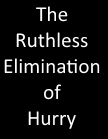
Scripture Story for the Week
Matthew 13:30-46
Parable of the Hidden Treasure

Pondering Point
Notice in this parable that the treasure involved is not easily found – hence the term “hidden.” Once the treasure is discovered, the one who found it is willing to sell (give up) everything else he has to gain this hidden treasure. Often it is like that with the kingdom of God (salvation and what comes with it): It is overlooked in favor of lesser, cheaper “treasures.” There is an irony here when compared with the devotions from earlier this week. If we seek God first and give everything up for this "hidden treasure," He commits to provide even such things that previously had displaced Him in our lives – the lesser treasures (see Matthew 6:33).
Matthew 13:30-46
30 Let both grow together until the harvest. At that time I will tell the harvesters: First collect the weeds and tie them in bundles to be burned; then gather the wheat and bring it into my barn.’”
The Parables of the Mustard Seed and the Yeast
31 He told them another parable: “The kingdom of heaven is like a mustard seed, which a man took and planted in his field. 32 Though it is the smallest of all seeds, yet when it grows, it is the largest of garden plants and becomes a tree, so that the birds come and perch in its branches.”
33 He told them still another parable: “The kingdom of heaven is like yeast that a woman took and mixed into about sixty pounds of flour until it worked all through the dough.”
34 Jesus spoke all these things to the crowd in parables; he did not say anything to them without using a parable. 35 So was fulfilled what was spoken through the prophet:
“I will open my mouth in parables,
I will utter things hidden since the creation of the world.”
The Parable of the Weeds Explained
36 Then he left the crowd and went into the house. His disciples came to him and said, “Explain to us the parable of the weeds in the field.”
37 He answered, “The one who sowed the good seed is the Son of Man. 38 The field is the world, and the good seed stands for the people of the kingdom. The weeds are the people of the evil one, 39 and the enemy who sows them is the devil. The harvest is the end of the age, and the harvesters are angels.
40 “As the weeds are pulled up and burned in the fire, so it will be at the end of the age. 41 The Son of Man will send out his angels, and they will weed out of his kingdom everything that causes sin and all who do evil. 42 They will throw them into the blazing furnace, where there will be weeping and gnashing of teeth. 43 Then the righteous will shine like the sun in the kingdom of their Father. Whoever has ears, let them hear.
The Parables of the Hidden Treasure and the Pearl
44 “The kingdom of heaven is like treasure hidden in a field. When a man found it, he hid it again, and then in his joy went and sold all he had and bought that field.
45 “Again, the kingdom of heaven is like a merchant looking for fine pearls. 46 When he found one of great value, he went away and sold everything he had and bought it.
Hook Question

Use this question with your group when you are using Bible stories as central to your time together.
- Share a time when you found money or some other object of value; what did you do with it?
Bible Storying’s Core Questions
- What did you like (or learn new) about the story?
- What did you not like (or not understand) about it?
- What are the various people doing in the story? With whom do you identify within the story?
- What is God doing in the story?
- What might God be asking of you triggered by this story?
- How is he challenging you?

For a lot of people, things aren't just things; they are identities. Shopping is now the number one leisure activity in America, usurping the place previously held by religion. Amazon.com is the new temple. The Visa statement is the new altar. Double-clicking is the new liturgy. Lifestyle bloggers are the priests and priestesses. Money is the new god. There's a reason the only other god Jesus ever called out by name was Mammon – the god of money. Because it's a bad god and a lousy religion.
~ J.M. Comer, The Ruthless Elimination of Hurry, pp. 180, 181